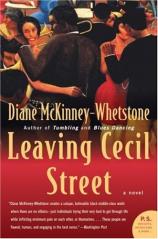Reading Group Guide
Discussion Questions
Leaving Cecil Street: A Novel

1. To what extent do the men in Leaving Cecil Street -- Joe, Little Freddie, and the Corner Boys -- use music to seek redemption for their sins and failures? Unlike Alberta's desperate need to be forgiven by her church elders, how does their music teach them to express their remorse and to forgive themselves? How does it give them newfound strength?
2. How did Alberta's religious convictions -- both intentionally and unintentionally -- cast a long shadow over her daughter's childhood and adolescence? How did Alberta ultimately come to realize what her devout faith had cost her daughter? Do you think that Neet will be able to overcome the trauma of her past? Will she be able to believe again in her own goodness?
3. The decay of Louise's teeth due to her fear of dentists, in some ways mirrored the dissolution of her marriage due to her fear that Joe would abandon her for another woman. How was Louise imprisoned by her fear of her imagined thoughts? What role did her long-ago decision to deny him his saxophone play in his ultimate decision to stray from her? Are you able to forgive Joe's infidelities?
4. What elements did you feel helped McKinney-Whetstone's to capture a lost time and place? What products, games, or images do you associate with life on Cecil Street? What slang or language best encapsulated the rhythm of the block? If you were to draw a picture of Cecil Street, what would be the enduring image from the novel that you would select?
5. What do you think possessed Sondra to want to perform Neet's abortion -- was her intent simply to help Neet? Or do you think she was driven by her desire to have money to spend at Sonny's or was her motivation her determination to put into practice the techniques she believed that she had mastered by observing her mother? How much responsibility did you think that she should bear for what happened to Neet?
6. How was Louise's private pain soothed by taking care of Deucie? How did caring for her in Deucie's dying hour allow Louise to finally grieve the loss of her own mother? How was Louise able to at long last "tell Mother good-bye" -- in a way that she could not as a "little girl, only ten"?
7. Leaving Cecil Street is told through a kaleidoscopic, constantly shifting point of view. What do you think of this technique? Did it enhance the story, or would you have preferred the use of an omniscient narrator?
8. We find out late in the novel that Joe and Alberta had known each other intimately when Alberta was forced to work as a prostitute and Joe was her john. How would you describe their relationship throughout the story? How did this recast your impression of their earlier interaction in the novel?
9. Do you think Deucie's presence on the block was a catalyst for change? If so, in what way?
10. Discuss the significance of the title Leaving Cecil Street. Why do you think McKinney Whetstone chose this title? Is there any other title that you would suggest for the novel?
11. What did Alberta gain by living in such close proximity to her former lover? What do you believe was her true motivation for asking Brownie to move to Cecil Street? If Joe had married "C.", instead of Louise, do you think that they would have been able to find happiness together, or would Alberta's troubled past have haunted their relationship?
12. Why was unwavering loyalty to one another so important to the residents of Cecil Street -- especially in the hours after Neet's failed abortion? How did McKinney Whetstone capture this sense of collective pride and community identity?
13. Discuss the line at the conclusion of the novel that stated: "Though Alberta left Cecil Street that night, this time Cecil Street didn't leave her." What deeper meaning might this line have about the woman Alberta was on the verge of becoming?
14. What do you think the future held for the residents of Cecil Street? Was there a character or characters that you would like to revisit in another novel, or do you believe that their spirits were meant solely for Leaving Cecil Street and the reader's own imagination?
Leaving Cecil Street: A Novel
- Publication Date: March 1, 2005
- Paperback: 320 pages
- Publisher: Harper Perennial
- ISBN-10: 0060722894
- ISBN-13: 9780060722890







